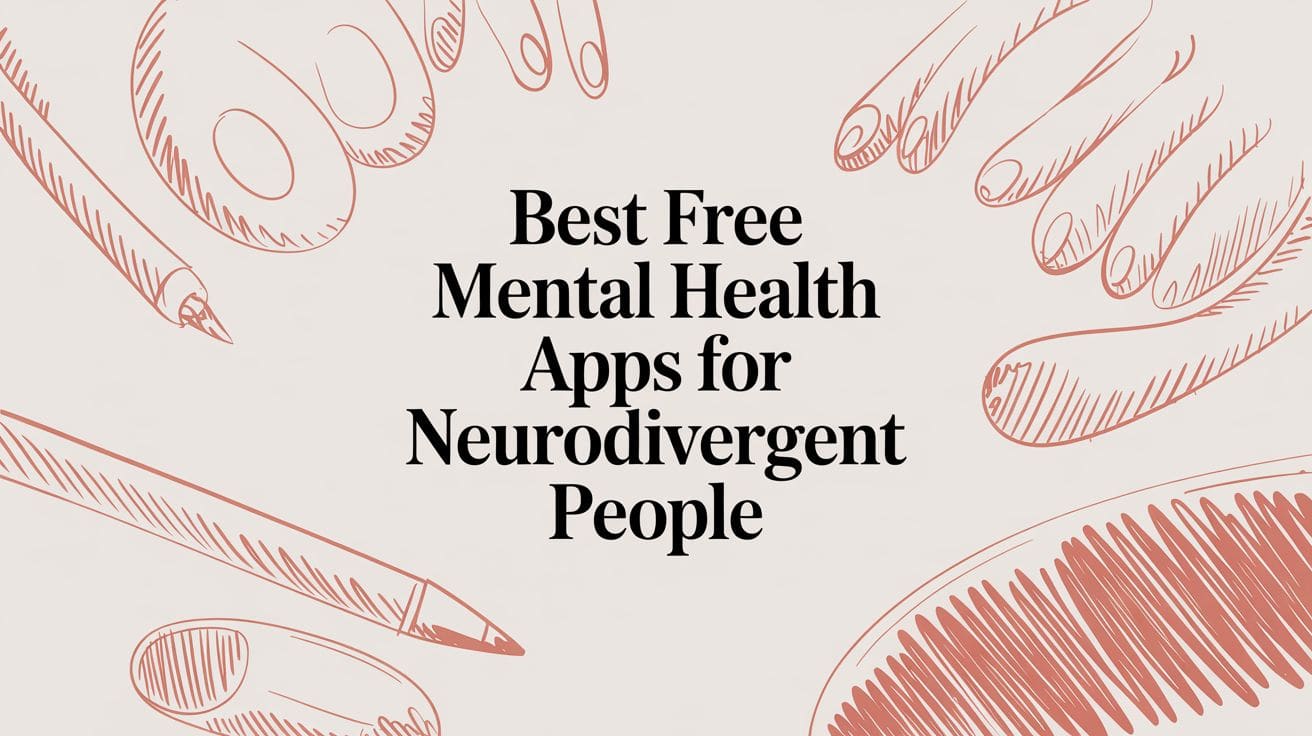
Finding the best free mental health apps that genuinely support neurodivergent minds, especially for those with autism, ADHD, or who are introverted, can feel overwhelming. Many popular apps are designed for a neurotypical audience, often lacking the structure, customisation, and sensory-friendly design needed to thrive. This guide cuts through the noise, focusing on practical, effective, and truly free resources that cater to the specific needs of neurodivergent individuals. We will explore apps that help manage overwhelm, provide structured support, and offer a safe, private space for self-reflection without the pressure of constant social interaction.
1. Mind App Library (Mind x ORCHA): Your Clinically Vetted Starting Point
Starting the search for the best free mental health apps can feel overwhelming, especially when you need tools that understand neurodivergent experiences. The Mind App Library, a collaboration between UK mental health charity Mind and the Organisation for the Review of Care and Health Apps (ORCHA), cuts through the noise. It isn't an app itself, but a curated, web-based directory of apps that have been rigorously assessed against clinical, data privacy, and usability standards. This makes it an invaluable first stop for anyone, particularly autistic adults or professionals with ADHD, who need assurance that an app is safe and effective before investing their time.
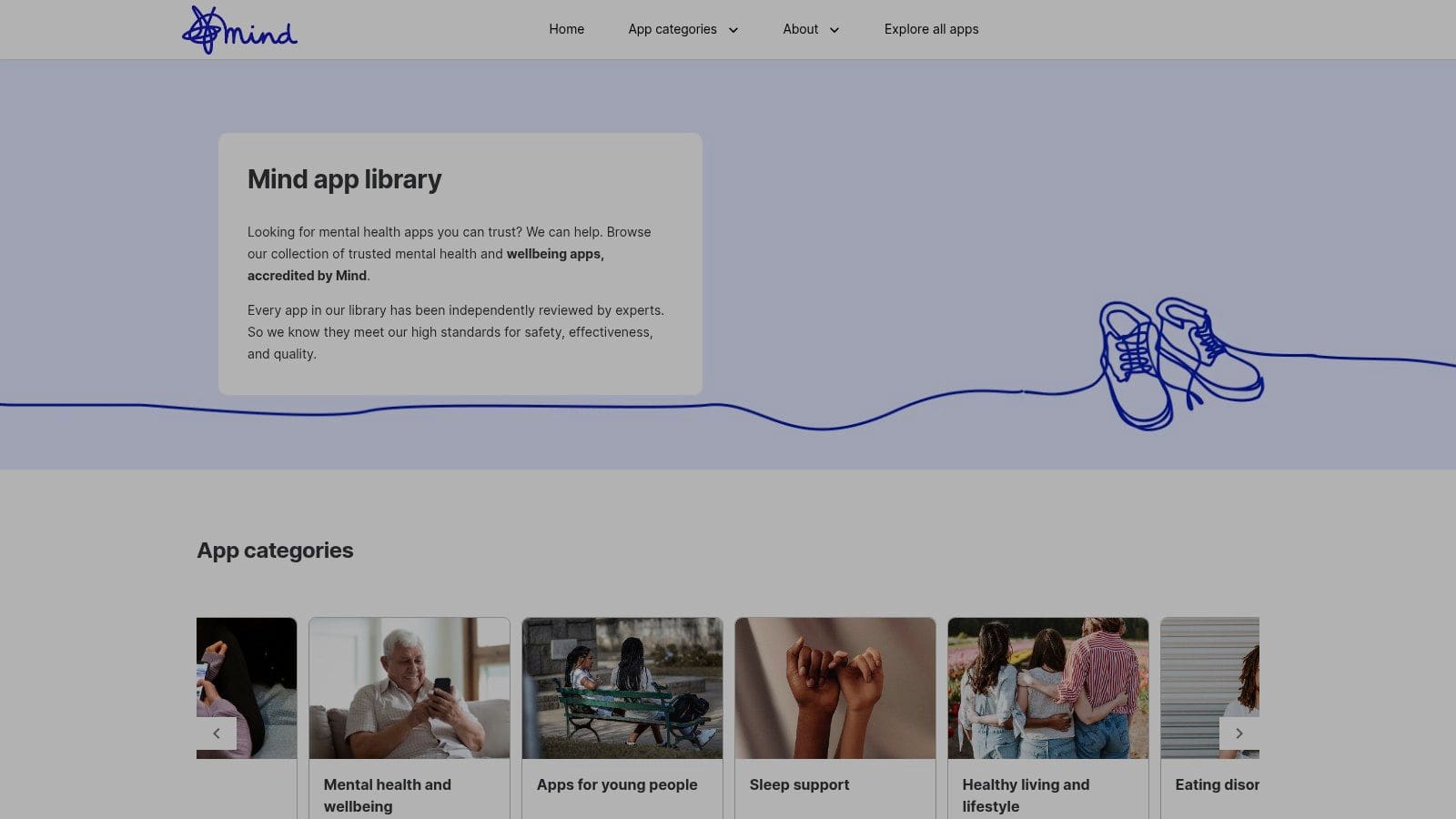
The platform's strength lies in its clear, structured approach. You can filter apps by specific needs like anxiety, low mood, sleep, or self-harm, which is useful for finding targeted support. For neurodivergent users, this filtering system helps identify tools that might aid with executive function or sensory regulation without having to sift through hundreds of generic "wellness" apps. Each listing clearly outlines data privacy practices, a critical factor for anyone cautious about sharing personal information. This focus on safety and transparency is also crucial for those managing mental health at work and needing discreet, reliable support.
Practical Use and Considerations
Using the library is straightforward: browse, filter, and read the detailed ORCHA reviews before deciding to download an app from the official app stores.
* Pros: Curated by a trusted UK charity, features robust clinical and data safety reviews, and is easier to navigate than a crowded app store for finding quality options.
* Cons: Not all listed apps are entirely free; many operate on a freemium model with paid tiers. The library's selection also changes as apps are reassessed by ORCHA.
Website: https://mind.orchahealth.com/
2. Good Thinking (NHS-backed, London)
For London-based residents, Good Thinking offers a trusted, NHS-approved digital wellbeing service. Like the Mind App Library, it is a web-based platform rather than a single app. Its primary function is to guide users through a quick digital self-assessment for common issues like stress, low mood, anxiety, and poor sleep. Based on your answers, it provides personalised, clinically reviewed recommendations, signposting you to free or discounted apps and resources. This guided approach is particularly beneficial for neurodivergent individuals who may feel overwhelmed by choice and need a clear, structured path to find suitable support.
The platform's major advantage is its NHS backing, ensuring all recommendations meet high clinical safety and efficacy standards. It often provides Londoners with free access codes to premium apps that would otherwise require a subscription, making high-quality digital tools more accessible. This is especially useful for teens with ADHD or autistic adults who want to trial different tools without a financial commitment. It removes the guesswork and provides a direct, vetted route to support for anyone feeling unsure about what to do when overwhelmed by the sheer volume of options available.
Practical Use and Considerations
The process is simple: complete a short, confidential self-assessment on the website to receive a tailored list of recommended apps and digital resources.
* Pros: NHS-vetted and clinically approved, offers personalised recommendations, and provides free premium access codes to certain apps for Londoners.
* Cons: Primarily designed for and offers full benefits to London residents. Recommendations often redirect to external app stores for downloading.
Website: https://www.good-thinking.uk/
3. Apple App Store (UK): A Vast Ecosystem with Native Tools
For iOS users, the Apple App Store (UK) is the default gateway to finding mental health support, but its value extends beyond just being a marketplace. It's a vast, integrated ecosystem where editorial curation and strict privacy controls provide a safer searching environment. This is especially beneficial for parents or neurodivergent users who need a trusted source before downloading apps. Apple's own features, like the Health and Mindfulness apps, provide a solid, free foundation for tracking mood and practising guided meditations directly on your device without needing a third-party service.
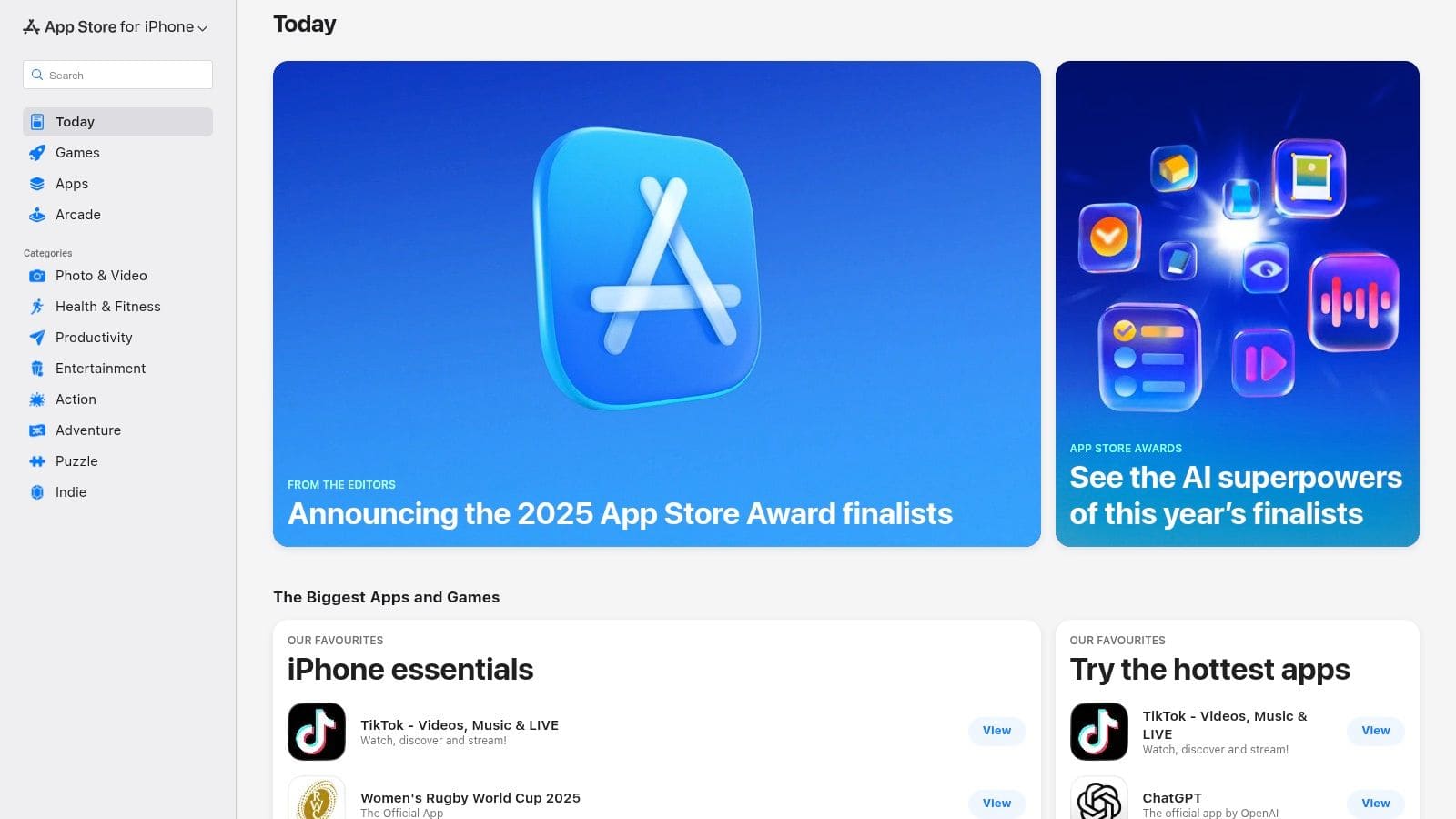
The App Store's strength is its sheer volume combined with robust platform-level privacy labels, which transparently show how apps handle your data. This is a critical feature for anyone with social anxiety or ADHD who might be cautious about personal information. Editorial collections like "Apps for Mindfulness" often spotlight high-quality tools, helping to cut through the noise. Beyond specific apps like stem4, a comprehensive guide to UK mental health resources for teens can help young people and their caregivers discover a wider array of accessible support and digital tools. Furthermore, its parental controls and Family Sharing make it a more manageable platform for families supporting neurodivergent teens.
Practical Use and Considerations
Using the App Store effectively means leveraging its filters, reading user reviews, and checking the privacy labels before you download. It's an excellent place to find some of the best apps for ADHD adults that integrate well with the iOS system.
* Pros: Huge selection of apps with tight iOS privacy controls, native Health and Mindfulness features are free and built-in, and supports parental controls for family use.
* Cons: Many "free" apps rely heavily on a freemium model with expensive subscriptions, and the sheer number of options can be overwhelming without curated lists.
Website: https://apps.apple.com/gb/
4. Google Play Store: The Android User's Gateway
For Android users, the Google Play Store is the primary marketplace for discovering mental health apps, offering an immense catalogue that caters to every need. While it's not a curated library, its sheer volume makes it an essential resource. The platform provides critical information upfront, such as developer details, user reviews, and update frequency, which helps users make more informed decisions before downloading an app to support their mental wellbeing.
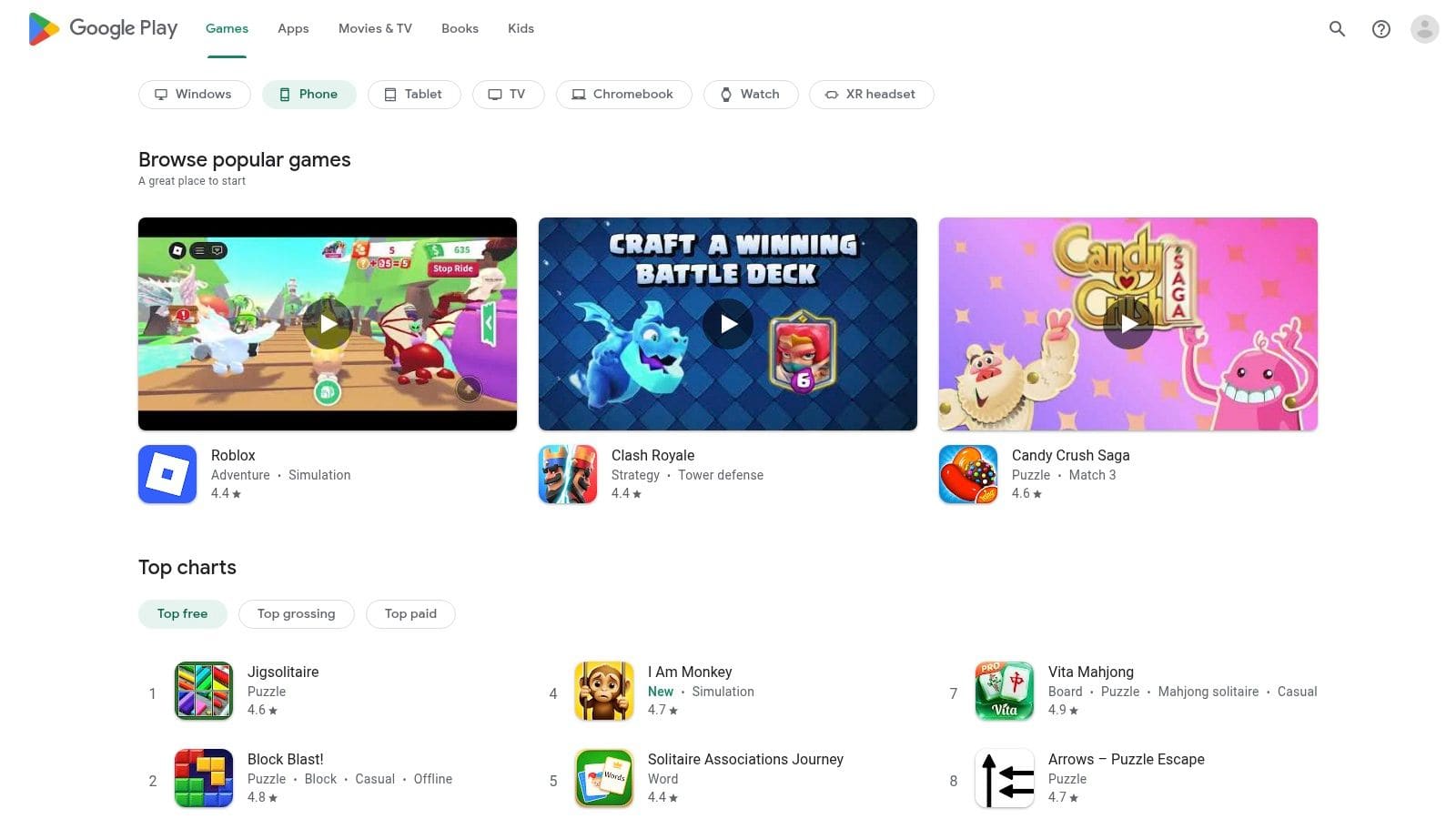
Its key advantage for neurodivergent individuals, including autistic adults and those with ADHD, is the transparency around app permissions and device compatibility. Before installing, you can see exactly what data an app wants to access, which is vital for maintaining privacy. Users can also look for "Editor's Choice" badges, which often signify higher quality and usability. Searching with specific terms like "ADHD organiser" or "autism communication" can help filter the massive selection to find tools tailored to specific executive function or sensory needs.
Practical Use and Considerations
The most effective way to use the Google Play Store is to read recent user reviews, check the "Data safety" section, and note the last update date.
* Pros: The biggest selection of apps for Android devices, transparent information on app permissions and update history, and useful user reviews to gauge quality.
* Cons: Quality and privacy standards vary widely between developers, making it crucial to vet each app carefully. The vast choice can also be overwhelming without specific search terms.
Website: https://play.google.com/store
5. stem4 (UK charity) – Suite of Free, Evidence-Based Apps
For teens and young adults, particularly those with ADHD or anxiety, finding targeted support that is genuinely free can be difficult. The UK-based charity stem4 addresses this gap with its suite of five clinically designed, evidence-based apps. Unlike broad wellness platforms, each app focuses on a specific challenge: Calm Harm for managing self-harm urges, Clear Fear for anxiety, Move Mood for low mood, Combined Minds for family support, and Worth Warrior for body image issues. This makes them some of the best free mental health apps for targeted, practical intervention without hidden costs or advertisements.
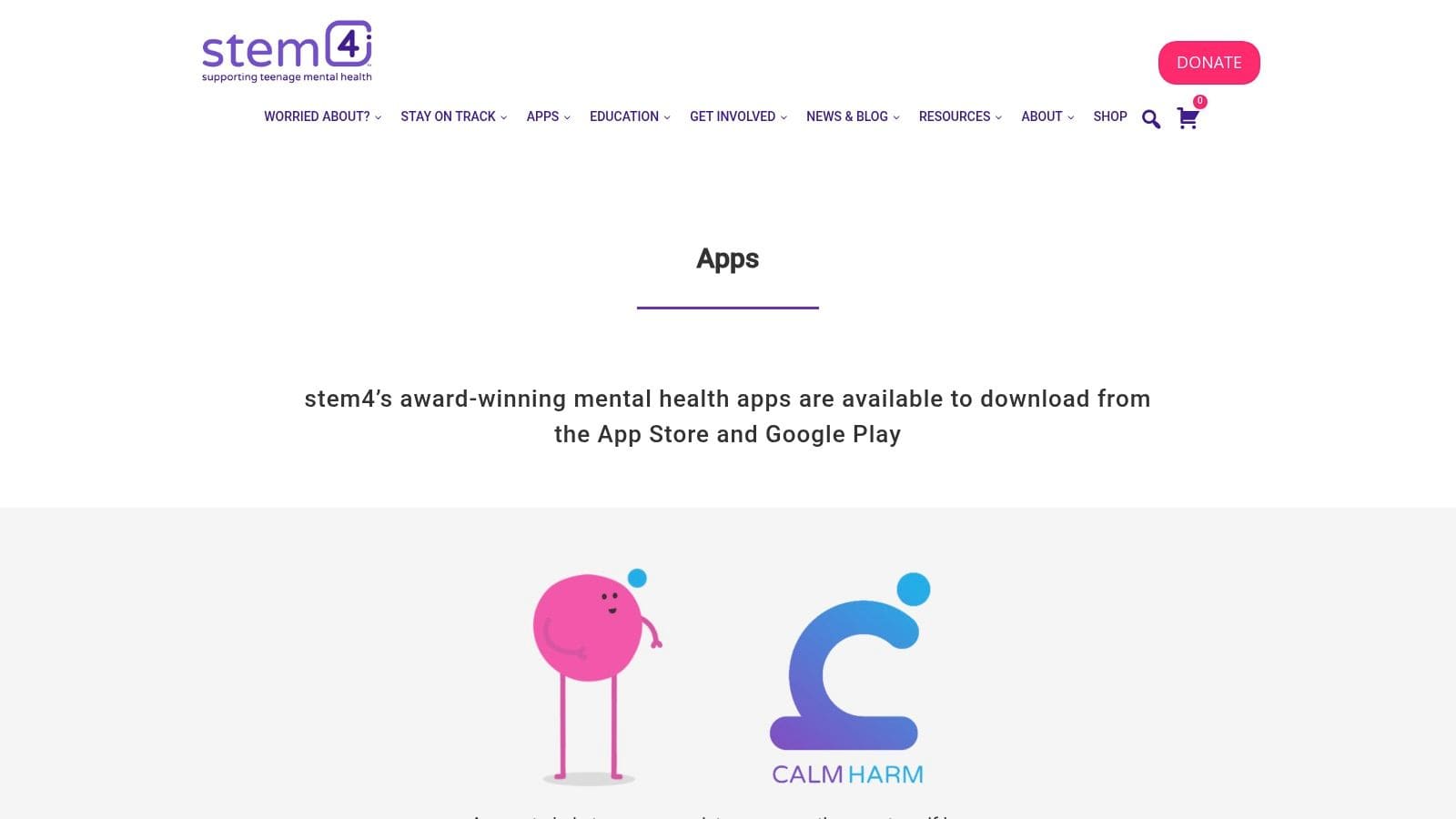
The apps are built on established therapeutic principles like Cognitive Behavioural Therapy (CBT) and Dialectical Behaviour Therapy (DBT), providing structured exercises that are easy to follow. This is particularly helpful for neurodivergent users who may benefit from clear, step-by-step guidance rather than open-ended journaling prompts. For instance, the Calm Harm app uses the DBT technique of "riding the wave" with a timer and suggested distraction activities, offering an immediate, concrete action during a crisis. The charity's commitment to privacy is also a major plus, as no personal identifiers are collected, ensuring a safe space for users. The strategies in apps like Clear Fear align well with established techniques, similar to how cognitive behavioural therapy for social anxiety is structured.
Practical Use and Considerations
Users can visit the stem4 website to learn about each app and download the one that best fits their needs directly from their device's app store.
* Pros: Entirely free with no ads or subscriptions, clinically informed and widely recommended by UK services like the NHS, and focuses on specific youth-centred issues with a strong privacy policy.
* Cons: Each app has a narrow focus, so you may need to download multiple apps for different issues. The design is more functional and clinical than glossy or gamified.
Website: https://stem4.org.uk/apps/
6. Stay Alive (Grassroots Suicide Prevention): Essential Crisis Support
For moments of intense crisis, finding immediate, clear, and safe support is paramount. The Stay Alive app, developed by UK charity Grassroots Suicide Prevention, is a vital resource designed specifically for this purpose. It offers a focused toolkit for individuals experiencing suicidal thoughts or for those concerned about someone else. The app provides practical, life-saving tools without the complexity of a full-scale therapy platform, making it accessible during overwhelming moments when executive function may be impaired.
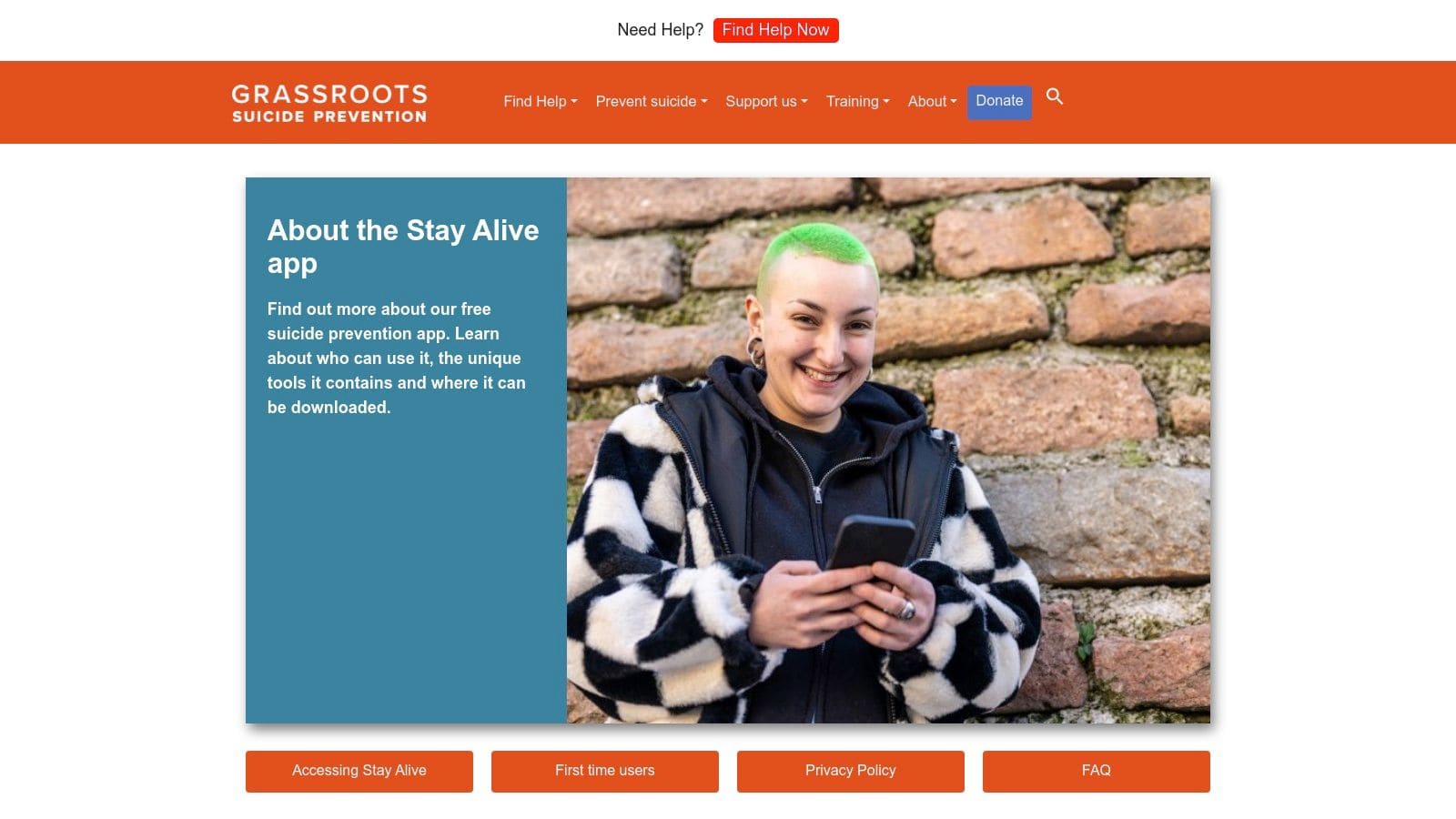
Its core feature is a customisable "My Safety Plan" that users can fill out when they feel well, detailing strategies and contacts for when a crisis hits. For autistic users or those with ADHD, this structured planning can be a crucial preventative measure. The app also includes grounding exercises, a "LifeBox" to store hopeful images and memories, and direct links to UK-based crisis services. This UK-specific signposting ensures users are connected to relevant, local support quickly and efficiently, a critical advantage over more generic international apps.
Practical Use and Considerations
The app is intended for immediate crisis intervention and pre-planning, not ongoing therapeutic work. It's best to set up the Safety Plan and LifeBox during a calmer period.
* Pros: Completely free with no ads, recommended by many NHS trusts, provides focused UK-specific crisis resources, and is available across multiple platforms including a web version.
* Cons: It is not a replacement for therapy; its primary function is crisis support and safety planning. Some tools are most effective when personalised in advance.
Website: https://prevent-suicide.org.uk/stay-alive-app-grassroots-suicide-prevention/about-stay-alive/
7. Wysa (AI-guided self-help + free tier): Anonymous AI Chat Support
Wysa offers a unique approach by providing an AI-powered "emotionally intelligent" penguin chatbot available 24/7. This anonymous and non-judgemental space is particularly valuable for neurodivergent individuals, especially teens and adults with ADHD or autism, who may find text-based conversation a less demanding way to process emotions and thoughts. The app uses principles from Cognitive Behavioural Therapy (CBT) and Dialectical Behaviour Therapy (DBT) to guide users through self-help exercises for managing anxiety, low mood, and sleep issues.
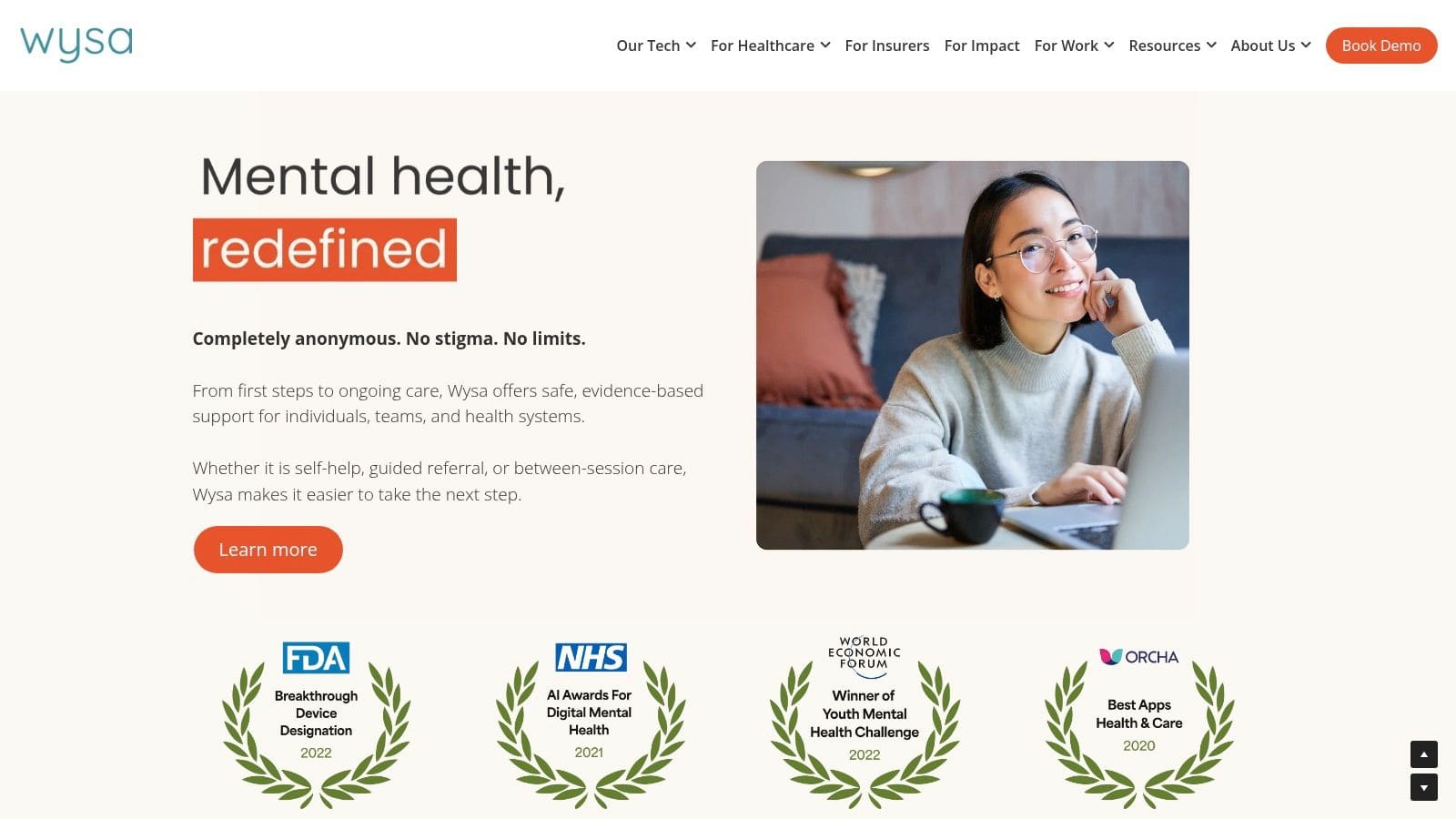
Its core strength lies in its immediate, guided self-help format. For someone introverted or experiencing social anxiety, the ability to "talk" through feelings without the pressure of a human interaction can be a significant first step. The structured, tool-based approach also appeals to those with ADHD who benefit from clear, actionable steps rather than open-ended journaling. While the core AI chat and basic exercises are free, it's worth noting that Wysa is sometimes funded by local authorities or NHS trusts in the UK, offering free premium access to young people in certain regions, making it one of the most accessible apps for social anxiety.
Practical Use and Considerations
The app is best used for in-the-moment support and skill-building. You can start a conversation with the AI penguin anytime you feel overwhelmed or simply want to explore a thought pattern.
* Pros: Instant 24/7 AI chat support is completely free, anonymous, and requires no sign-up. Its structured CBT/DBT exercises provide tangible skills.
* Cons: Human coaching and specialised programmes require a paid subscription. The AI is a supportive tool but is not a replacement for professional therapy, especially in a crisis.
Website: https://www.wysa.com/
8. Insight Timer (large free library): Your Go-To Meditation Hub
For those seeking variety without a price tag, Insight Timer stands out as a powerful free resource. It offers an astonishingly vast library of over 250,000 free guided meditations, talks, music tracks, and sleep stories. This makes it an ideal resource for neurodivergent users, such as autistic adults or those with ADHD, who may need to experiment with different styles, voices, and lengths to find what truly helps them focus, calm down, or drift off to sleep. Instead of being locked into a single teaching style, you can explore thousands of teachers from around the world.
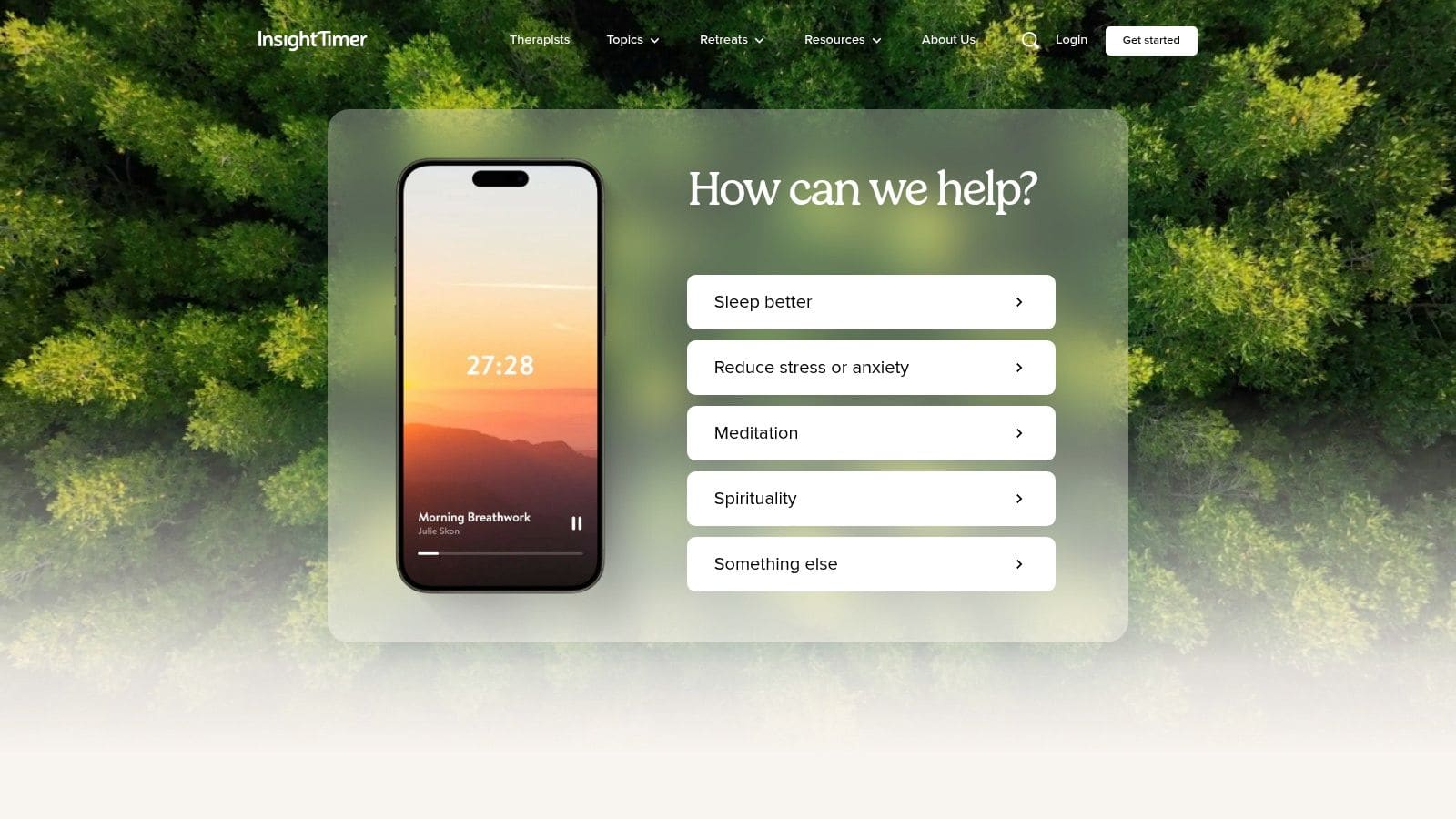
The platform's core strength is its community-driven approach and sheer volume of no-cost content. You can use the customisable meditation timer for unguided practice, join live yoga sessions, or listen to talks on topics ranging from anxiety to self-compassion. For introverted individuals, the app provides a way to feel connected through community groups and live events without the pressure of direct interaction. The constant influx of new daily content ensures there is always something fresh to discover, preventing the listening fatigue that can come with more limited apps.
Practical Use and Considerations
The app is best used by exploring its filters to narrow down the immense library by duration, benefit (like sleep or stress), or specific teacher.
* Pros: An exceptionally deep and diverse free library of content, an active global community, and frequent new additions from thousands of teachers.
* Cons: The huge volume of choices and busy interface can feel overwhelming at first. Premium courses and certain features require a paid MemberPlus subscription.
Website: https://insighttimer.com/
9. Medito Foundation (100% free, non-profit): Truly Free, Mission-Driven Mindfulness
In a market saturated with "freemium" wellness tools, Medito Foundation stands out because it is genuinely, 100% free. Run by a non-profit, volunteer-led charity, Medito offers guided meditations, mindfulness exercises, and sleep content without ever showing an ad or hiding features behind a paywall. This makes it an exceptional choice for anyone, including students or those on a tight budget, who wants consistent, quality support without financial barriers. For neurodivergent users wary of exploitative app design, its transparent, mission-driven approach provides a safe and predictable environment to build a mindfulness practice.
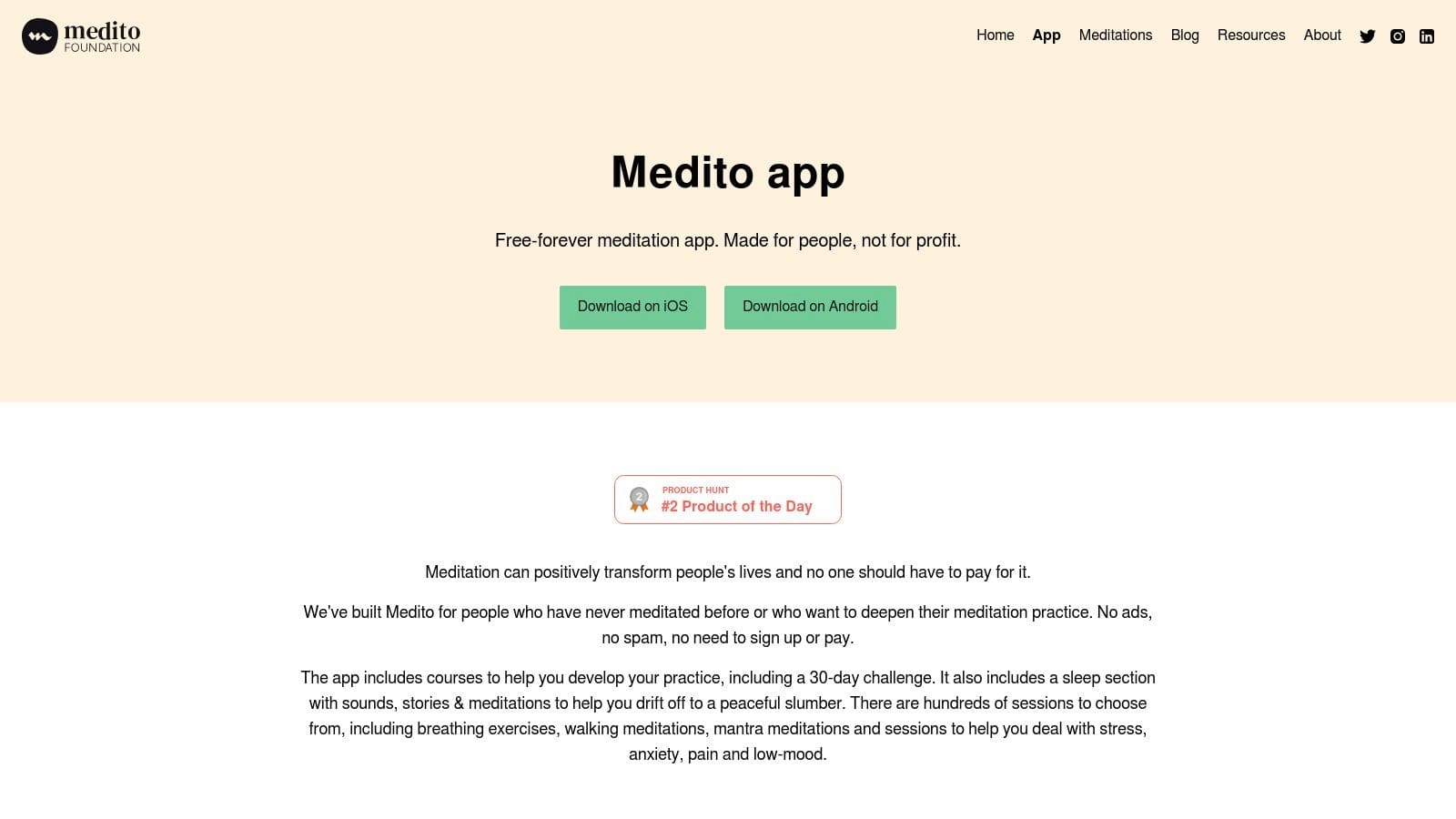
The app is built on a simple, uncluttered interface that avoids overwhelming users with too many options-a common challenge for individuals with ADHD or sensory sensitivities. It offers structured courses for beginners, daily meditations, and specific packs for managing stress, anxiety, or difficult emotions. The ability to download sessions for offline use is a practical feature for maintaining routines without relying on a constant internet connection. Medito's focus on core, evidence-based mindfulness techniques delivers foundational support without the distracting gamification or social features found in many commercial apps, making it ideal for introverted users seeking a quiet, personal practice.
Practical Use and Considerations
To get started, simply download the app and explore the library. The beginner's course is an excellent entry point, guiding you through the fundamentals of meditation in short, manageable sessions.
* Pros: Completely free forever with no ads or subscriptions, developed by a non-profit foundation, and features a simple, privacy-friendly interface.
* Cons: The content library is smaller than paid competitors like Headspace or Calm, and it lacks advanced features or community engagement options.
Website: https://meditofoundation.org/medito-app
10. Smiling Mind (non-profit, fully free)
Developed by psychologists and educators, Smiling Mind is a standout among free mental health resources because it is entirely free, with no hidden costs or subscription tiers. This Australian non-profit offers a vast library of over 700 mindfulness meditations and structured programmes designed for all ages, from young children to adults. Its comprehensive, curriculum-like approach makes it an excellent tool for families wanting to build a shared mindfulness practice or for individuals with ADHD who benefit from structured, sequential learning paths to manage focus and emotional regulation.
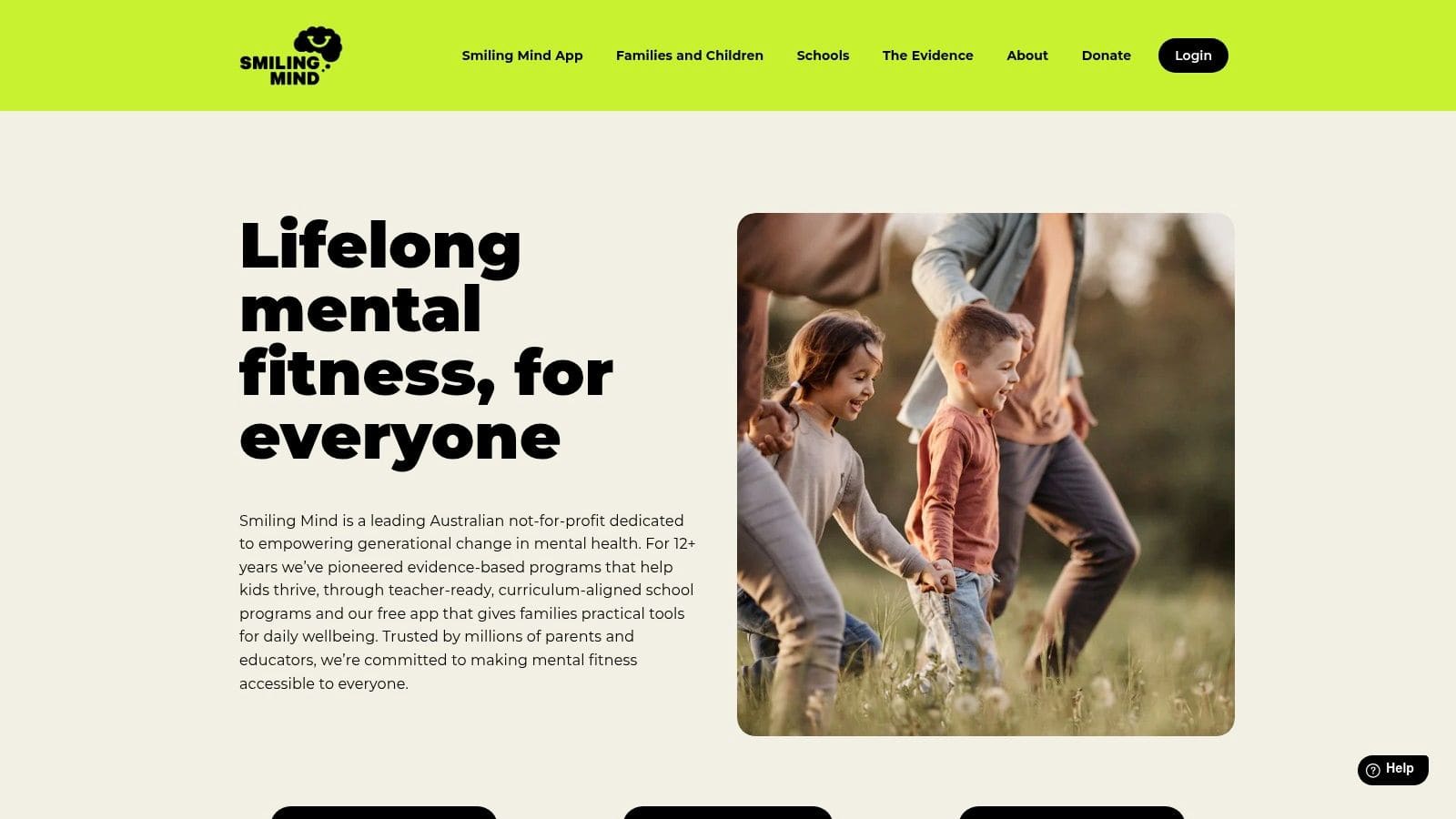
The app's design is clean and user-friendly, allowing users to easily navigate programmes tailored for home, school, or the workplace. For autistic users or those with sensory sensitivities, the calm and gentle guidance in the meditations can be particularly grounding. Features like mood check-ins and progress tracking help users observe patterns in their mental wellbeing over time, providing tangible feedback that is often helpful for neurodivergent individuals who appreciate data-driven self-awareness. It provides a reliable, safe space to build a sustainable mental fitness routine without financial pressure.
Practical Use and Considerations
The app is ideal for establishing a consistent mindfulness habit, with programmes clearly categorised by age and specific goals like improving sleep or managing stress.
* Pros: Entirely free with no ads or subscriptions, extensive content library with structured programmes, and well-suited to families and educational settings.
* Cons: Some guided sessions feature a noticeable Australian accent and context, which may be distracting for some UK users. It also offers less UK-specific signposting to external support services compared to UK-based charity apps.
Website: https://www.smilingmind.com.au/
11. PTSD Coach (VA/DoD; globally available)
For those managing trauma alongside neurodivergent traits like autism or ADHD, finding a focused tool is essential. PTSD Coach, developed by the US Department of Veterans Affairs (VA), is one of the best free resources available globally for understanding and managing symptoms of post-traumatic stress disorder. While its origins are US-based, its practical, evidence-informed tools are universally applicable, offering structured support without any cost or data privacy concerns, as it stores information locally on your device.
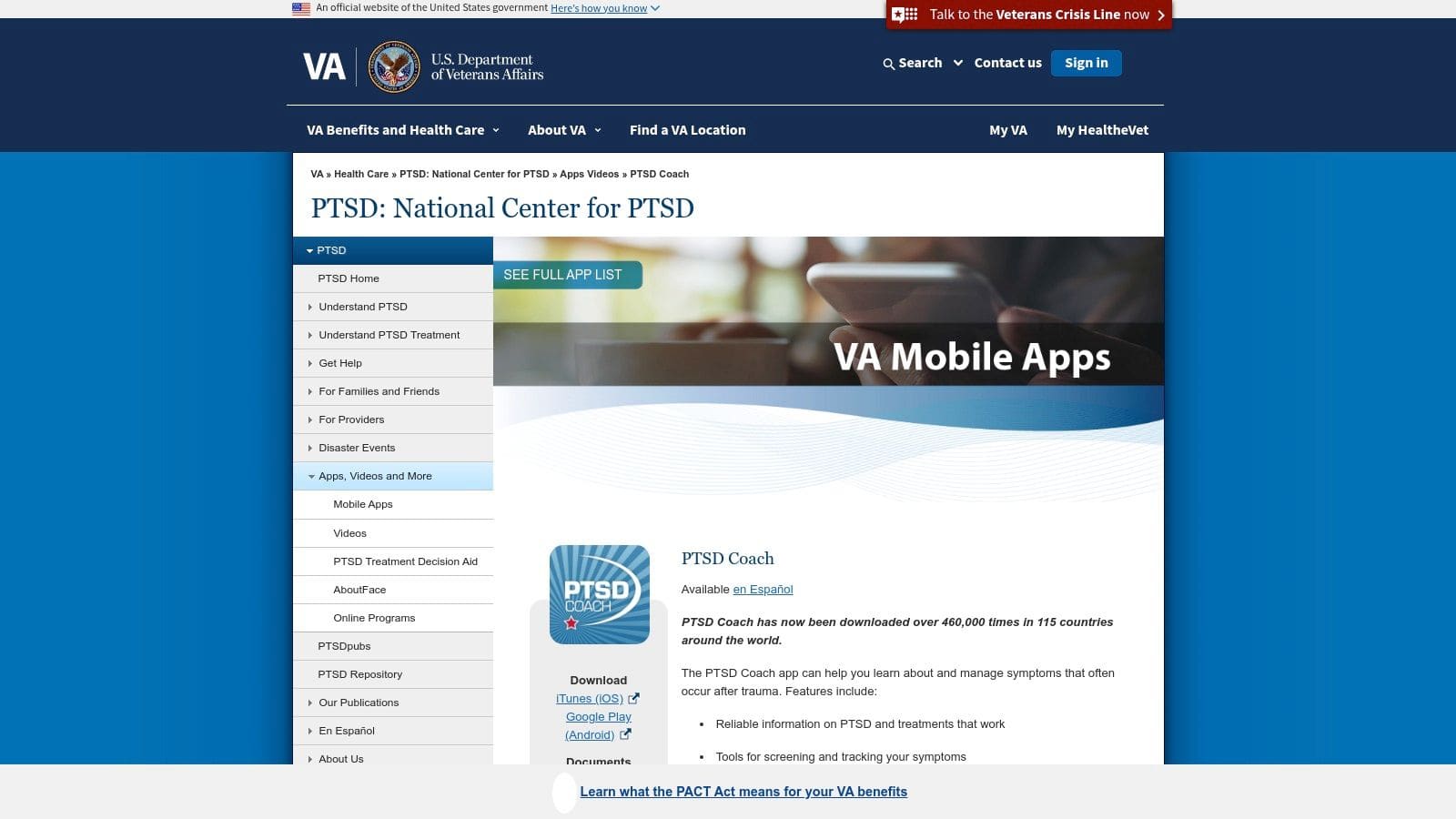
The app excels in providing immediate, actionable coping mechanisms. For neurodivergent individuals who may experience heightened sensory responses or emotional dysregulation when triggered, its library of grounding exercises, deep breathing guides, and positive self-talk prompts offers a clear, predictable way to regain a sense of control. You can customise tools based on what works for you and create a personalised safety plan, which is a valuable feature for managing moments of intense distress. Its no-nonsense, clinical approach cuts straight to providing practical help, which many users will find more effective than generic wellness apps.
Practical Use and Considerations
The app serves as an educational and in-the-moment symptom management tool. Users can learn about PTSD, track symptoms, and access guided exercises whenever needed.
* Pros: Completely free with no hidden costs, based on clinical research, and offers practical, on-demand tools for managing trauma-related symptoms.
* Cons: Resource links and emergency contacts are US-centric, and it should not be used as a substitute for professional clinical care in the UK.
Website: https://www.ptsd.va.gov/PTSD/appvid/mobile/ptsdcoach_app.asp
12. Mozilla "Privacy Not Included" – Mental Health Apps Guide
Before you entrust your most sensitive thoughts to an application, understanding its data privacy practices is non-negotiable. This is where Mozilla's "Privacy Not Included" guide becomes an essential resource, acting as a data security watchdog for mental health apps. Like the Mind App Library, it is not an app itself but a web-based research tool. It offers independent, easy-to-understand privacy and security reviews, highlighting potential red flags like data sharing, weak password policies, and excessive user tracking. This is particularly crucial for neurodivergent individuals who may share detailed personal information related to their experiences with autism or ADHD and need to be certain that data remains confidential.
The guide's strength is its directness. It translates complex privacy policies into plain English, assigning a "*Privacy Not Included" warning to apps with concerning practices. This empowers users, especially those managing conditions like social anxiety, to make informed choices without needing a degree in data law. For parents supporting neurodivergent teens, it provides a straightforward way to vet the safety of an app before their child uses it, ensuring personal data isn't being monetised or mishandled. Mozilla's rigorous, independent research helps you identify trustworthy tools that respect your privacy first.
Practical Use and Considerations
The guide is a crucial pre-download checkpoint. Use its findings to compare apps and eliminate any that fail to meet basic security and privacy standards before you even visit an app store.
* Pros: Independent, free, and easy-to-understand reviews that demystify complex data policies, helping users avoid privacy-risky apps.
* Cons: It does not evaluate clinical effectiveness or therapeutic quality. Some reviews focus on US-market apps, though many are also available in the UK.
Top 12 Free Mental Health Apps — Quick Comparison
| Product | Core features ✨ | Trust / Quality ★🏆 | Price / Value 💰 | Target audience 👥 | Unique selling point ✨ |
|---|---|---|---|---|---|
| Mind App Library (Mind x ORCHA) | Curated ORCHA‑assessed app library; filters by need; privacy flags | ★★★★ 🏆 (NHS‑aligned, clinical oversight) | 💰 Free to browse (listed apps may have paid tiers) | 👥 UK users & clinicians seeking clinically‑reviewed apps | ✨ Third‑party ORCHA assessments + charity curation |
| Good Thinking (NHS‑backed, London) | Quick self‑assessments; personalised signposting; clinical review | ★★★★ 🏆 (NHS‑approved content) | 💰 Free (London focus; occasional premium codes) | 👥 London residents & local service seekers | ✨ NHS‑backed personalised signposting |
| Apple App Store (UK) | Editorial collections; reviews; Apple Health/Mindfulness integrations | ★★★ 🏆 (strong platform privacy; variable app quality) | 💰 Varied — free/freemium; in‑app purchases (GBP) | 👥 iOS users wanting broad selection + platform controls | ✨ Apple privacy + Health integrations |
| Google Play Store | Large Android catalogue; permissions & compatibility info | ★★★ (wide quality variance) | 💰 Varied — many freemium apps | 👥 Android users seeking wide choice | ✨ Extensive catalogue & transparent permissions |
| stem4 (UK charity) | Five evidence‑based youth apps (CBT/DBT/BA); no ads | ★★★★ 🏆 (clinically designed; DTAC/ORCHA assessed) | 💰 Free & ad‑free | 👥 Teens, families, schools | ✨ Youth‑focused, clinically recognised tools |
| Stay Alive (Grassroots) | Safety planning; crisis tools; UK signposting; web + apps | ★★★★ 🏆 (NHS‑recommended for crisis support) | 💰 Free & ad‑free | 👥 People at risk of suicide & supporters | ✨ Crisis‑focused safety planning and resources |
| Wysa (AI‑guided) | 24/7 AI chat; CBT self‑help packs; optional human coaching | ★★★★ (widely used; not a substitute for therapy) | 💰 Free core; subscription for coaching/features | 👥 People wanting instant self‑help & coaching options | ✨ 24/7 AI chat + optional human coaches |
| Insight Timer | 250k+ free guided meditations; live events & community | ★★★★ (massive free library; mixed quality) | 💰 Mostly free; MemberPlus paid tier | 👥 Meditation, sleep & community seekers | ✨ One of the largest free meditation libraries |
| Medito Foundation | Charity‑run mindfulness; offline downloads; evidence‑based | ★★★★ 🏆 (mission‑driven, privacy friendly) | 💰 100% free — no ads, no paywall | 👥 Users seeking free, privacy‑focused meditation | ✨ Permanently free, non‑profit model |
| Smiling Mind | 700+ lessons; age‑based programs; mood check‑ins | ★★★★ (education & family focus) | 💰 Free core app | 👥 Families, schools, young people | ✨ Structured school & family programs |
| PTSD Coach (VA/DoD) | Symptom self‑assessment; grounding; safety‑plan export | ★★★★ 🏆 (research‑informed, clinical) | 💰 Free | 👥 People managing PTSD symptoms | ✨ VA/DoD research‑backed PTSD tools |
| Mozilla "Privacy Not Included" | App privacy reviews; tracker & data‑sharing red flags | ★★★★ 🏆 (independent privacy analysis) | 💰 Free privacy guides | 👥 Privacy‑conscious users & commissioners | ✨ Clear, plain‑English privacy red‑flags |
How to Choose and Safely Use Your Mental Health App
Navigating the landscape of mental health support can feel overwhelming, but finding the right tool doesn't have to be another source of stress. This guide has offered a curated look at some of the best free mental health apps, specifically focusing on resources that honour the needs of neurodivergent individuals, including autistic adults and those with ADHD. We have explored everything from NHS-backed platforms like Good Thinking to fully non-profit meditation libraries such as Medito Foundation and Smiling Mind, all with a critical eye on privacy, accessibility, and genuine utility.
The key takeaway is that the "best" app is deeply personal. It's the one that aligns with your specific needs, respects your privacy, and fits seamlessly into your life without creating more pressure. An app that works brilliantly for an ADHD teen managing study focus might not be the right fit for an autistic professional seeking tools for emotional regulation. Your individual requirements are the most important filter.
Your Personalised Action Plan
Feeling ready to take the next step? Don't just download the first app that looks interesting. Use this structured approach to make a deliberate and informed choice that serves your well-being.
1. Define Your Primary Goal:
Before you even open the app store, clarify what you need most right now. Are you looking for:
- In-the-moment support? For anxiety or overwhelm, an app like *Wysa* with its AI chat or *stem4's Clear Fear* could provide immediate, structured exercises.
- Routine building? To establish a daily mindfulness practice, a library-style app like *Insight Timer* or the completely free *Medito* offers variety and structure.
- Crisis intervention? For urgent support, having an app like *Stay Alive* installed provides a direct, reliable safety net.
- Information and vetting? Use resources like the *Mind App Library* and Mozilla's *"Privacy Not Included"* guide to check the safety and evidence base of any app you are considering.
2. Scrutinise Privacy and Data Policies:
Your mental health data is incredibly sensitive. Do not skip this step. Look for apps that prioritise on-device processing, meaning your data stays on your phone. Read the privacy policy to understand what information is collected, how it's used, and if it's shared with third parties. An app with a confusing or non-existent privacy policy is a significant red flag.
3. Test Drive with a Trial Period:
Most of the apps listed offer substantial free tiers. Use this to your advantage. Commit to trying one or two apps for a full week. Assess how you feel using them.
- Is the user interface intuitive or frustrating?
- Are the notifications helpful reminders or intrusive demands?
- Does the tone and language resonate with you? For neurodivergent users, an app that uses clear, direct language without overwhelming sensory input is often more effective.
4. Consider the Bigger Picture of Digital Accessibility:
The responsibility for a safe digital experience doesn't just lie with the user. It's crucial that developers and platforms are committed to building accessible digital spaces for mental well-being. This wider context of creating inclusive technology ensures that everyone, regardless of their neurotype or ability, can access support safely and effectively.
Ultimately, these digital tools are just that: tools. They are supplements, not substitutes, for professional care when needed. They can empower you with skills, provide comfort during difficult moments, and help you build routines that support your mental health. By choosing thoughtfully and using these resources intentionally, you are taking a powerful, proactive step in managing your well-being on your own terms.
If you're a neurodivergent professional looking to better manage workplace communication and reduce meeting fatigue, consider tonen. It's a tool that provides real-time feedback on your tone of voice, helping you navigate social cues more confidently in professional settings. Explore how tonen can complement your mental health toolkit by making professional interactions clearer and less draining.